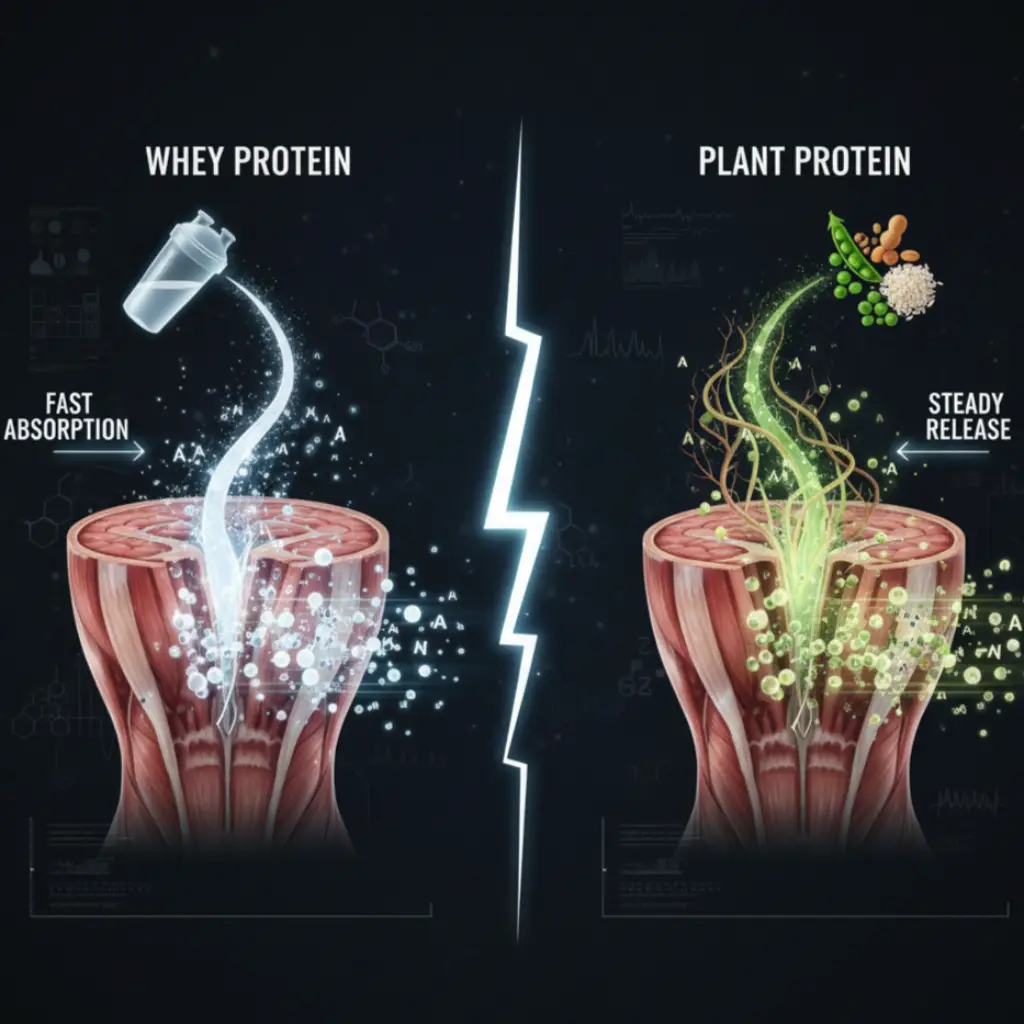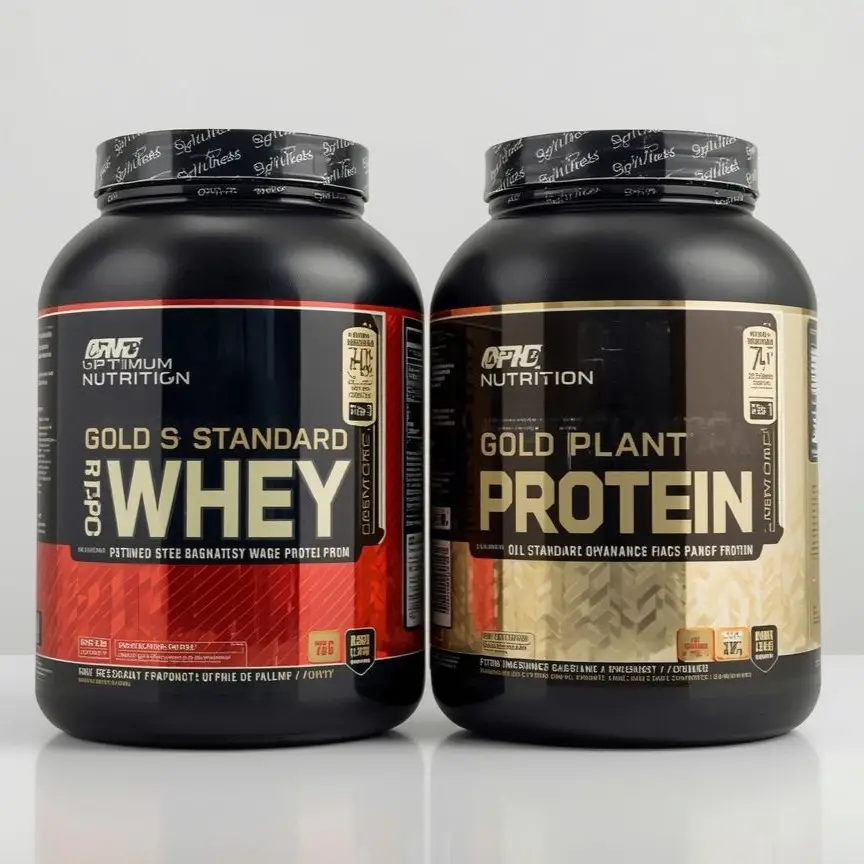Protein powders are everywhere, but one debate never dies: whey vs plant protein. Athletes, bodybuilders, and casual gym-goers ask the same question: which protein is best for muscle growth, fat loss, and overall health? This guide breaks down the science, clears up myths, and helps you make the right choice for your goals.

Table of Contents
Whey Protein vs Plant Protein Basics
What Is Whey Protein and Why It’s Popular
Whey protein is derived from milk during cheese production. It’s one of the fastest-digesting protein sources available. This speed matters after a tough workout when your muscles crave amino acids.
Whey protein benefits include:
- High biological value and complete amino acid profile
- Rich in leucine, the amino acid most responsible for muscle protein synthesis
- Affordable and widely available
- Proven track record in hundreds of studies
What Is Plant-Based Protein Powder?
Plant-based protein powder comes from sources like peas, soy, rice, and hemp. It has gained traction thanks to veganism, lactose intolerance, and sustainability awareness.
Unlike whey, not all plant proteins are complete. However, modern blends combine pea and rice proteins to achieve a full amino acid profile.
Nutritional Profiles Compared
Protein Quality and Amino Acids
The quality of protein matters as much as the amount. Whey scores high because it’s complete and rich in leucine.
Plant protein varies: soy is complete, pea is almost complete, rice lacks lysine. That’s why blends are now standard in plant-based protein powder products.
Digestibility and Absorption
- Whey: absorbed quickly, making it great for post-workout shakes
- Plant protein: digests slower, which may help with satiety and blood sugar control
Whey vs Plant Protein for Muscle Gain
Best Protein Type for Muscle Gain
Science consistently shows whey has a slight advantage for building muscle. Its leucine content triggers muscle protein synthesis more efficiently.
However, research shows that vegan protein vs whey isn’t a huge difference when plant blends provide enough leucine. With the right dose (25–35g per serving), pea + rice can match whey’s results.
Real-World Application for Lifters
In practice, many lifters prefer whey post-workout and plant protein during the day for snacks or smoothies.
👉 Related: Protein Timing and Recovery
Whey vs Plant Protein for Weight Loss
Satiety and Calorie Control
Whey protein helps regulate appetite by releasing satiety hormones. Plant protein may keep you fuller due to natural fiber content.
Research on Fat Loss Outcomes
Studies comparing pea protein vs whey for weight loss show no significant difference when calories and protein are matched. Both can support fat loss when paired with a calorie deficit.
👉 Related: Protein for Weight Loss vs Muscle Gain
Health Considerations and Safety
Is Whey Protein Safe?
Yes, whey protein is safe for healthy individuals. Concerns about kidney or liver health come from myths, not evidence. The only caution: people with lactose intolerance or dairy allergies may need alternatives.
👉 Related: Protein Myths Debunked
Plant Protein Safety and Benefits
Plant protein is hypoallergenic, eco-friendly, and usually easier on digestion. Quality matters, since some cheap powders may contain heavy metals. Always check third-party tested products.
Practical Gym Use
Choosing Between Whey and Plant Protein
If your goal is muscle gain and you tolerate dairy, whey is convenient. If you’re vegan or lactose-intolerant, a blended plant protein works just as well when dosed correctly.
👉 Related: How Much Protein Do You Need?
Blending Whey and Plant for Best Results
Many athletes use both: whey for post-workout recovery and plant protein during the day for satiety. This approach offers flexibility, flavor variety, and nutrient diversity.
Product Comparisons and Recommendations

Gold Standard Plant Protein vs Classic Whey
Optimum Nutrition’s Gold Standard Whey has been a gym staple for decades. Its plant protein alternative offers a complete amino acid profile using pea, rice, and fava beans.
Comparison snapshot:
| Feature | Gold Standard Whey | Gold Standard Plant |
|---|---|---|
| Protein per Scoop | 24g | 24g |
| Digestibility | Fast | Moderate |
| Diet Suitability | Non-vegan | Vegan-friendly |
Best Uses by Fitness Goal
- Muscle gain: whey (or pea + rice blend)
- Weight loss: either works; plant protein may add satiety benefits
- General health: either, depending on dietary preference
👉 Related: Best Protein Powder for Beginners
Protein in the Context of Diets
Vegan Protein vs Whey in Different Diets
Different diets call for different strategies:
- Vegan: plant protein mandatory
- Keto: whey isolate fits low-carb macros
- Intermittent fasting: either works post-fast
👉 Related: Protein for Different Diets
Protein Supplements for Women vs Men
Men and women both benefit from whey or plant protein. The only difference lies in portion size and calorie targets.
👉 Related: Protein Supplements for Women vs Men
Conclusion
Both whey and plant protein can support muscle growth, fat loss, and overall health. Your choice depends on tolerance, ethics, and lifestyle. If you tolerate dairy and want quick recovery, whey is convenient. If you’re vegan or need digestion-friendly options, blended plant proteins are excellent.
👉 Before you buy, check out How to Read Protein Supplement Labels to avoid low-quality powders.
FAQs
Vegan protein vs whey reddit — what do lifters say?
On Reddit, lifters praise whey for taste and recovery, while plant protein is preferred for digestion and ethics.
Whey protein — is it the best choice for athletes?
Yes, whey is highly effective for recovery, but not mandatory. Plant proteins work if dosed properly.
Whey protein vs plant protein for muscle building — which wins?
Whey has a small edge scientifically. High-quality plant blends can achieve the same effect with correct dosing.
Whey vs vegan protein — what’s the difference?
Whey = dairy-based, fast-digesting, high leucine. Vegan protein = plant-based, slower-digesting, eco-friendly.
Visit my Instagram account for more
